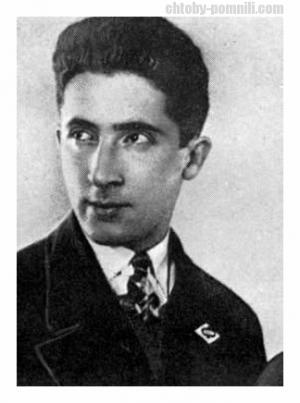Grigori Kozintsev Net Worth is
 $1.3 Million
$1.3 Million
Mini Biography

Grigori Mikhailovich Kozintsev was created on March 22, 1905, in Kiev, Russian Empire (right now Kiev, Ukraine). His dad, called Mikhail Kozintsev, was a physician. Young Kozintsev analyzed in the Kiev Gymnazium. There, in 1919, he structured experimental theater “Arlekin” regarding his fellow college students Sergei Yutkevich and Aleksei Kapler. During 1919 and 1920 Kozintsev analyzed art in the Kiev College of Art beneath the tutelage of Alexandra Exter. Tests. In 1920 Kozintsev relocated to Petrograd (Leningrad or St. Petersburg). There he analyzed art in the “VKHUTEMAS” in the Academy of Good Arts for just two years. In 1921 Kozintsev with Sergei Yutkevich, Leonid Trauberg, and Leonid Kryzhitsky structured and led the Manufacturing plant of Excentric Stars (FEKS). There Kozintsev aimed radically avant-garde staging of takes on “Zhenitba” (Relationship 1922) by Nikolai Gogol and “Vneshtorg na Eifelevoi Bashne” (Foreign trade on Eiffel Tower 1923). These were located in the previous Eliseev Mansion on Gagarinskaya road No. 1 in St. Petersburg. Kozintsev and FEKS collaborated with article writer Yuri Tynyanov, cinematographer Andrei Moskvin, youthful actor-director Sergey Gerasimov, musician Igor Vuskovich, and youthful composer Dmitri Shostakovich amongst others. Primarily FEKS was the primary system for experimental stars, directors and performers, and was highly inspired by Vsevolod Meyerhold and Vladimir Mayakovsky. Creative position. In 1924 Kozintsev and Trauberg found “SevZapKino” Studios (today Lenfilm Studios). There Kozintsev continuing his FEKS tests in his initial eccentric humor ‘Pokhozhdenie Oktyabriny’ (1924). Kozintsev’s early movies were highly criticized by formal Soviet critics. His film ‘Shinel’ (1926) was in comparison to German Expressionism and accused of distortion of the initial classic tale by Nikolai Gogol. Kozintsev highly argued against such evaluations with German expressionism; he was disappointed before end of his lifestyle about such criticism of his early experimental functions. Kozintsev insisted that his cheerful tests were important in the town of Petrograd (St. Petersburg) following the Russian Trend of 1917, which brought devastation, depression, criminal offense, and degradation of lifestyle. Early films. Kozintsev produced twelve films as well as Leonid Trauberg. Their cooperation started in 1921, in Petrograd (St. Petersburg). Their film-trilogy about Russian groundbreaking hero Maxim was created from 1935-1941, when people in the Soviet Russia had been terrorized beneath the most brutal dictatorship of Joseph Stalin. In departure from experimental youthfulness and independence of their FEKS years, the Maxim trilogy was a trade-off mixture of test and Soviet propaganda. It had been still a robust function and was also prohibited by censorship in america through the 1930s-1950s. For your function Kozintsev and Trauberg had been honored the Stalin’s Condition Reward in 1941. Following the Second Globe Battle Kozintsev and Trauberg produced their last film jointly: ‘Prostye Lyudi (Ordinary People 1946), that was censored and continued to be unreleased until 1958, when “Nikita Khrushchev’ raised the ban enforced by Stalin’s censorship. Features. Grigori Kozintsev ascended to his greatest works following the loss of life of Stalin. After that Nikita Khrushchev initiated the “Thaw” which performed a role in a few liberation of specific imagination in the Soviet film sector. Kozintsev’s adaptations of traditional literature mixed some experimental components of his previously silent films using the strategy of an adult get good at. His Don Quixote (1957), Ruler Lear (1969) and specifically Hamlet (1963) had been recognized world-wide as his highest accomplishments. In _Korol Lir (1969)_ Kozintsev produced an excellent decision to ensemble actors in the Baltic Expresses as the Lear’s family members. Jüri Järvet, Regimantas Adomaitis, Donatas Banionis, Juozas Budraitis, and Elza Radzina as well as Oleg Dal, Galina Volchek, Aleksey Petrenko produced a powerful performing ensemble. Hamlet and Ruler Lear. Kozintsev initial staged Shakespeare’s “Hamlet” and ‘Ruler Lear” in 1941. His cooperation with Boris Pasternak started in 1940, when Pasternak was focusing on his Russian translation from the Shakespeare’s originals. Both has were ready for stage under path of Kozintsev. Ruler Lear was staged in 1941, but additional function was interrupted due to the Nazi invasion from the Soviet Union. Hamlet was staged in 1954. At exactly the same time Kozintsev continuing developing the thought of filming _Gamlet (1964)_, until everything arrived collectively in his famous film. The version by Boris Pasternak, the music by Dmitri Shostakovich, the path by Kozintsev, as well as the performing skill of Innokentiy Smoktunovskiy created special innovative synergy. Innokentiy Smoktunovskiy was praised as the very best Hamlet by Sir Laurence Olivier. Legacy. In the 1920s Kozintsev trained in the Leningrad College of Performing. From 1944-1964 Kozintsev led his master-class for film directors in the Soviet Condition Film Institute (VGIK). Among his college students had been many prominent Russian directors and stars such as for example Sergey Gerasimov among others. Kozintsev was the top of master-class for film directors at Lenfilm Studios from 1964-1971. He composed essays on William Shakespeare, Sergei M. Eisenstein, Charles Chaplin, and Vsevolod Meyerhold and released theoretical functions on film path. Grigori Kozintsev resided near Lenfilm Stidios in Leningrad (St. Petersburg) generally of his lifestyle. His function and existence was necessary to the position of Lenfilm Studios aswell regarding the film community in Leningrad through the politics and financial domination of Moscow as the Soviet capital. From his early functions from the 1920s to his masterpiece _Gamlet (1964)_, Kozintsev was faithful to creative experimental strategy. Kozintsev was designated the People’s Musician from the USSR. He was honored the Condition Lenin’s Prize from the USSR (1965), and received various other honours and nominations. He passed away in Leningrad (St. Petersburg) on, may 11, 1973, and was laid to rest in the Necropolis from the Masters of Artwork in St. Aleksandr Nevsky Convent in St. Petersburg, Russia.
Known for movies




